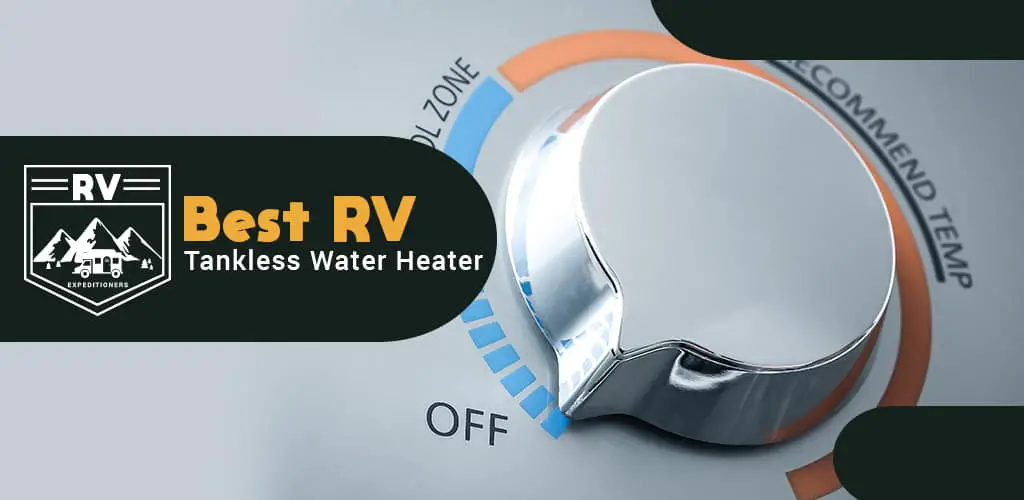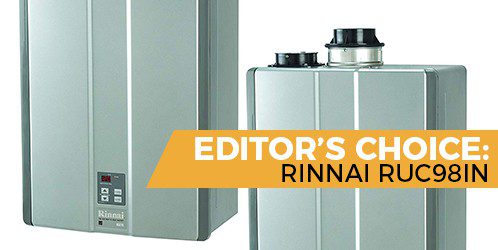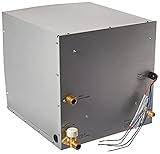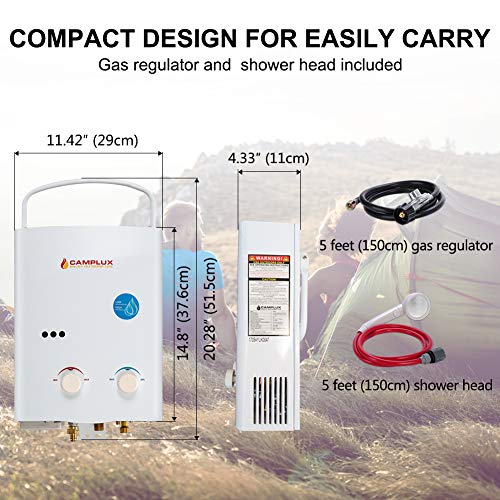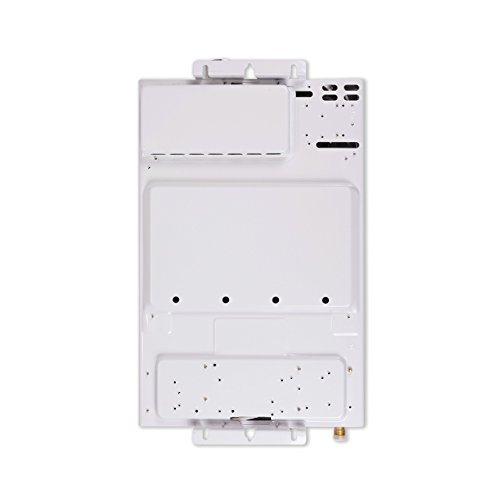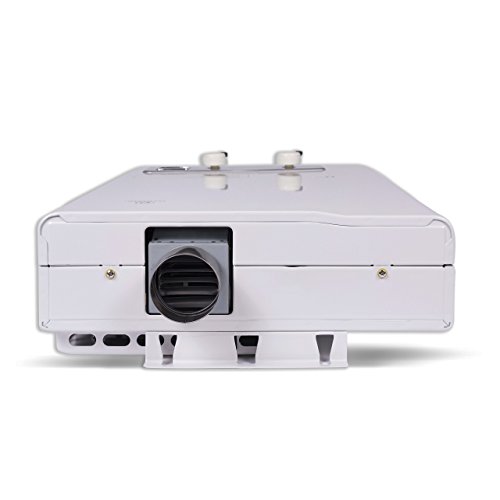Whether you’re in your house or your RV, you’ll be using a lot of water.
Cooking, drinking, and showering are all an essential part of everyday life, which means that water is integral to your daily habits and lifestyle.
In an RV, however, because all of the water onboard is put there, you have to be careful how you use it.
Nonetheless, one thing that you’ll need along with the water itself is a water heater.
Unfortunately, because space is always limited in your rig, having a bulky water heater isn’t usually the best idea.
Instead, many RVers choose to have a tankless water heater unit so that they can get access to hot water while saving room and energy at the same time.
So, with that in mind, we want to take a look at the best RV tankless water heaters and see how they can improve life inside your rig.
COMPARISON CHART
| IMAGE | PRODUCT | |
|---|---|---|
 | 1. Rinnai RUC98iN
| LEARN MORE ► |
 | 2. Camplux 5L 1.32 GPM
| LEARN MORE ► |
3. GIRARD 2GWHAM Tankless Water Heater
| LEARN MORE ► | |
 | 4. Eccotemp FVI12-LP
| LEARN MORE ► |
OUR TOP 5 PICKS
#1 Rinnai RUC98iN

Specifications
Weight | 82 pounds |
Product Dimensions | 10 x 18.5 x 26 inches |
Size | Twin Pipe/Ultra |
Flow Rate | 9.8 GPM |
Water Consumption | 9.8 gallons |
Features
Once again, we’re looking at a standard indoor tankless water heater that can be converted for use inside an RV. However, this is one of the best models you can find on the market regardless, meaning that it’s worth the extra cost and installation parameters.
199,000 BTU Rating
When comparing different tankless water heaters, you want to be sure that you’re getting more than enough power for your money. Although this is one of the more expensive options out there, with a BTU rating of up to 199,000, you can be sure that it’s worth every penny.
To put it into perspective, you can get your water up to 140 degrees F, making this one of the most potent water heaters we’ve seen.
Ultra-Low Emissions
As with any standard tankless water heater, you need to make sure that you install it correctly, including with the proper ventilation so that you don’t breathe propane while taking a shower or washing the dishes.
Fortunately, this model from Rinnai has one of the lowest emission ratings you can find. Even if you don’t have the best ventilation, this model is so well built that you can still use it safely.
That being said, always strive for as much ventilation as possible. Low emissions aren’t the same as no emissions, and oxygen deprivation is a serious issue if it does occur.
96% Energy Efficiency
Even when comparing this tankless water heater to something built for RVs specifically, this unit may still be the better choice when it comes to energy usage.
With a 96% efficiency rating, this is one of the best tankless water heaters you can find. In fact, you may want to get two - one for your RV and another for your home.
- WHAT WE DON’T LIKE
- PROS/CONS OVERVIEW
This is one of the most well-built and functional tankless water heaters on the market for RVs or otherwise. With low emissions, durable construction, and a highly efficient operating system, you’ll be glad that you installed this heater into your RV.
Video
#2 Camplux 5L 1.32 GPM

Specifications
Weight | 10.8 pounds |
Product Dimensions | 11.4 x 5.5 x 14.6 inches |
Size | pack of 1 |
Flow Rate | 1.32 GPM |
Features
Technically speaking, this tankless water heater is designed as a camping model, meaning that it’s usually supposed to be portable. However, it does come with a wall mounting bracket, and it can work for some RVs, so if you’re up for a bit of a complex installation process, this unit can serve you well.
Low Water Pressure Rating
One of the things that you’ll realize about installing an RV tankless water heater is that you won’t have access to high-pressure water systems like you do at home. Since RVs have limited capacity, they restrict your water usage to ensure that you don’t run out after your first shower.
Fortunately, since this is a portable camping model, it has one of the lowest water pressure ratings on the market. It can operate with as little as 10 PSI and 1.2 gallons per minute of flow.
Simply put, it doesn’t take much to activate this tankless heater, which helps you save time and money in the process.
Max 114-Degree Heat
Don’t let this tankless water heater’s size fool you - it’s still more than capable of delivering a piping hot shower. It has a temperature range of 48 to 114 degrees Fahrenheit, so if you like a toasty bathing experience, it can provide that in spades.
Built-In Safety Protections
One issue that comes from having a water heater on board your RV is that you have to rely on propane and fire to make it work. Also, because you’re in such a cramped space, you want to make sure that you’re not going to run into potential safety issues like fire hazards.
Thankfully, this heater has built-in protections to keep you and your family safe. First, it has a system that shuts off the whole thing if the flame goes out for any reason. Since you don’t want to suck down propane fumes, that can help save your life.
Speaking of breathing propane, there is an oxygen deprivation sensor in this tankless water heater as well. If, for whatever reason, the heater belches out too much propane, it will shut off automatically so that you don’t risk suffocation.
Finally, because you might be camping in some cold locations, this tankless water heater has anti-freezing protections as well.
- WHAT WE DON’T LIKE
- PROS/CONS OVERVIEW
Because this is a camping tankless water heater, making it work inside your RV can be a bit tricky to do. However, I appreciate the energy-saving design of this machine, as well as its built-in safety protocols. Also, the fact that you can light it with D batteries if necessary is a bonus.
Video
#3 GIRARD 2GWHAM Tankless Water Heater
Specifications
Brand | Girard Prod |
Power Source | Wind Powered,Ac/dc |
Item Dimensions LxWxH | 14.5 x 17.8 x 14.6 inches |
Item Weight | 22 Pounds |
Features
The Girard 2GWHAM Tankless Water Heater is the perfect choice for those who want to regulate the burner to maintain the set hot water temperature.
- WHAT WE DON’T LIKE
- PROS/CONS OVERVIEW
This powerhouse provides 42,000 BTUs of heating power to ensure that you always have hot water when you need it. It also features a burner regulation system that maintains the set temperature, so you never have to worry about your water getting too hot or too cold. Plus, installation is a breeze – no special lines or plumbing are required. Order your GIRARD 2GWHAM today and enjoy hot water on demand!
Video
#4 Eccotemp FVI12-LP
Specifications
Weight | 29.4 pounds |
Product Dimensions | 28 x 17 x 10.5 inches |
Size | 11-50 Gallons |
Flow Rate | 3.5 GPM |
Features
As the name suggests, this next tankless water heater is economical and energy efficient. Best of all, it’s perfect for those who are on a budget since it costs way less than most other models in its class.
That being said, this is another standard indoor model that has to be converted for RV usage, so still be prepared for professional installation when putting it into your rig.
Activates at 3.6 GPM
Although this model doesn’t have the lowest water-pressure rating, it’s more than low enough for most mid to large-size RVs. Since it will activate at just 3.6 gallons, it’s an ideal choice for many RVers who value economy over power.
Digital Temperature Display
Depending on where you install this tankless water heater, you may really appreciate the fact that you can see what the temperature is at any given time. Best of all, you can adjust the heat level accordingly, based on your needs and how much power you have at any given time.
Safe Electronic Ignition System
Whereas other tankless water heaters ignite via manual or analog systems, this unit from Eccotemp uses electricity. Not only is this version more reliable, but it’s much safer for you and your family as well.
- WHAT WE DON’T LIKE
- PROS/CONS OVERVIEW
If you’re going to install a standard tankless water heater into your RV, then you might as well use a model that is both energy efficient and lightweight. Fortunately, this model from Eccotemp is both (and more).
Video
BUYER'S GUIDE
Because having a tankless water heater in your rig can be such a rewarding experience, you want to make sure that you’re doing everything correctly. Also, since most RVs aren’t equipped with tankless heaters, you need to be ready for any complications that may arise during installation.
With that in mind, I wanted to go over some of the more crucial elements to consider before putting a tankless water heater into your RV.
Estimate Your Current Water Consumption
The first question you have to ask yourself is - do I need a tankless heater in the first place? Yes, these models provide a ton of benefits, from energy efficiency to economy of space. However, if you’re not using that much water to begin with, installing a new heater may be unnecessary.
Thus, before you proceed with anything, you should monitor your water use habits. Also, consider the difference between RVing full time vs. going out for vacation once or twice a year.
In the latter situation, it may be better to forgo a complicated installation process since you don’t use your RV that much. If you’re a full-timer, however, then a tankless unit may be the perfect solution for your rig.
I would suggest monitoring your water usage for at least a week or more before deciding on the right water heater unit. Also, keep in mind how much pressure your system needs as well, as that will limit which heaters you can put into your rig.
Do I have to use the shower head or is it okay to connect directly to the hot water side of a faucet?
With some portable water heaters (like the Camplux at the top of the list), they come with a shower head, not a standard water connector.
If you do decide to go with a portable model like that, you can usually decouple the shower head and connect the hose directly into your RV’s water system.
However, if you mostly need a new tankless heater for your showers (instead of cooking and cleaning), then it may be better to keep the shower head on instead. This way, you can attach the heater to your shower directly and keep the old unit installed for the rest of your RV.
While this tactic won’t save space in the long run, it could be much more efficient, not to mention much easier to implement.
Can I install a tankless water heater under an RV sink?
The short answer is yes, but the long answer is “it depends.” Because the space underneath your sink may be limited, some water heaters might be too large or bulky to install there.
However, if the model does fit, then you can usually benefit by putting the water heater next to the source that will use it the most.
Thus, if you’re mostly looking for a new RV tankless water heater for your shower, installing it under the sink is probably not the best option. However, if that’s the only place that works, keep in mind that the water temperature can fluctuate the longer the distance is between the heater and the output.
How to convert RV water heater to tankless?
Technically speaking, you don’t want to try and convert your RV to tankless by yourself. Instead, I highly recommend consulting with a professional beforehand for both safety and efficiency reasons.
Considering that you may be installing a standard indoor tankless water heater, consulting with a pro means that you can be sure that you won’t run into potential issues. Even if you’ve carefully calculated your water pressure and energy needs, there’s no guarantee that the model you’ve chosen will be compatible.
Overall, you want to be extra cautious and take your time when converting your RV. Also, if you’re not inside your rig that often, it may be too much of a hassle to do it anyway.
CONCLUSION
We’ve looked at some high-quality RV tankless water heaters, but I have to say that my favorite thus far was the Rinnai model. Although it’s relatively costly, it offers the best features of anything else on this list.
Low emissions, high energy efficiency, and one of the best BTU ratings are just a few of the reasons why I love this tankless heater.
However, if you’re more budget-minded, the highly portable Camplux Water Heater is by far the best way to go, especially if you’re looking for a quick and dirty way to improve the quality of your showers.

